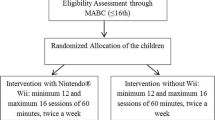Abstract
This article presents a review of work related to therapies and tools used in fine motor stimulation in order to establish the parameters and characteristics necessary to define the creation of an interactive board with 5 different activities as an alternative therapy proposal. This board is implemented as a tool that serves as a support for therapists in sessions of fine motor stimulation in order to innovate in traditional therapies. This is possible since it is known that the use of technology allows us to create attractive and fun tools for children, who show more attention and dedication when interacting with a tool as if it were a toy. This tool is created with the intention of transforming stimulation therapies into fun gaming sessions in order to get children to carry out activities that help strengthen and stimulate the muscles necessary for correct development in their daily and school activities, which involve a digital grip, tri-digital grip, strength in the fingers and hands, hand-eye coordination, assimilation of request for activities by audios and finally motivational feedback in case children fail and positive feedback in the case of finishing the activity correctly. For therapists these tools are the fundamental basis of the sessions; that is why innovation plays a key role since the more interactive and attractive sessions, the greater openness to the experience, which originates better results.
Access this chapter
Tax calculation will be finalised at checkout
Purchases are for personal use only
Similar content being viewed by others
References
Bahadori Khosroshahi, J.J.N.: Investigate the effect of perceptual-motor exercises with gross and fine motor skills in students with cerebral palsy. 3(9), 25–40 (2017)
Akinola, B.I., Gbiri, C.A., Odebiyi, D.O.: Effect of a 10-week aquatic exercise training program on gross motor function in children with spastic cerebral palsy 6 (2019). https://doi.org/10.1177/2333794X19857378
Mirzaie, H., Hosseini, S.A., Riazi, A., Ghasemi Fard, F., Jafari Oori, M., Hossein Zadeh, S., et al.: The Effect of a Perceptual-Motor Program Based on Johnstone and Ramon Method on Gross Motor Skills of Children With Visual Impairment: A Randomized Controlled Trial. 21(1), 88–105 (2020)
Pradana, F.G.A., Juniarisca, D.L.: The development of MODEREN to increase gross motor skills of students with mild mental retardation. In: 4th International Conference on Sport Science, Health, and Physical Education (ICSSHPE 2019), pp. 24–26. Atlantis Press (2020)
Berrezueta-Guzmán, J., Serpa-Andrade, L., Robles-Bykbaev, V., Pinos-Velez, E.: Digital trainer for the development of the fine motor ability in children with cerebral palsy. In: MATEC Web of Conferences: EDP Sciences, p. 20006 (2016)
Berrezueta-Guzman, J., Robles-Bykbaev, V., Serpa-Andrade, L.: How is the quality of life of patients with cerebral palsy improved? qualitative and quantitative evaluation of a communication and learning assistance system based on ICTs. In: International Conference on Applied Human Factors and Ergonomics, pp. 73–81. Springer (2017)
Bonnechere, B., Sholukha, V., Omelina, L., Van Vooren, M., Jansen, B., Jan, S.V.S.J.G., et al.: Suitability of functional evaluation embedded in serious game rehabilitation exercises to assess motor development across lifespan, vol. 57, 35–39 (2017)
Gámez-Granados, J.C., Rodriguez-Lozano, F.J., Acampora, G., Lee, C.-S., Soto-Hidalgo, J.M.: JKinect: a new Java Software for Designing and Assessing Gross Motor Activities in children with autism based on JFML. In: 2020 IEEE International Conference on Fuzzy Systems (FUZZ-IEEE), pp. 1–8. IEEE (2020)
Bossen, D., Broekema, A., Visser, B., Brons, A., Timmerman, A., van Etten-Jamaludin, F., et al.: Effectiveness of serious games to increase physical activity in children with a chronic disease: systematic review with meta-analysis 22(4), e14549 (2020)
Amendaño-Murrillo, S., Dutá-Gómez, C., Robles-Bykbaev, V., Suquilanda-Cuesta, P., Pérez-Muñóz, D., Pérez-Muñóz, A.: A virtual robotic assistant and expert system to provide development and rehabilitation exercises for gross motor skills in children with disabilities. In: 2020 IEEE World Conference on Engineering Education (EDUNINE), pp. 1–5. IEEE (2020)
Escorcia, C.L.A., Muñoz, A.P., de Oro, C.D.C.M., De La Rosa, E.E.B.: Pérez ALMJRCdP. Effectivenes Intensive Phys. Therapy Orphan Diseases 92(3), 1–14 (2020)
Wajdi, H., Suwastika, N.A., Rjrjitsi, Y.: IoT architecture that supports the stimulation of gross motor development in children aged 5–6 years using drop box game. 6(2), 119–29 (2020)
Rahmanto, I.N., Suwastika, N.A., Yasirandi, R.J.J.R.: How Can IoT Applicable to Practice Gross Motor Skill Through Hopscotch Game? 4(3), 584–590 (2020)
Acknowledgments
To the Corporación Ecuatoriana para el Desarrollo de la Investigación y Academia, CEDIA, for the funding provided to research, development and innovation, through CEPRA projects, especially the CEPRA - XIII - 2019 project; “IA Transtornos Motores (Entorno inteligente interactivo baso en aprendizaje de maquina y sistemas embebidos para el soporte en los procesos de seguimiento y aprendizaje de niños con trastornos motores)’’.
Author information
Authors and Affiliations
Corresponding author
Editor information
Editors and Affiliations
Rights and permissions
Copyright information
© 2021 The Author(s), under exclusive license to Springer Nature Switzerland AG
About this paper
Cite this paper
Serpa-Andrade, L., González-González, S., Robles-Bykbaev, V.E., León-Pesántez, A., Mata-Quevedo, P. (2021). Analysis of the Use of Digital Tools as Support in Fine Motor Stimulation Therapy. In: Shin, C.S., Di Bucchianico, G., Fukuda, S., Ghim , YG., Montagna, G., Carvalho, C. (eds) Advances in Industrial Design. AHFE 2021. Lecture Notes in Networks and Systems, vol 260. Springer, Cham. https://doi.org/10.1007/978-3-030-80829-7_68
Download citation
DOI: https://doi.org/10.1007/978-3-030-80829-7_68
Published:
Publisher Name: Springer, Cham
Print ISBN: 978-3-030-80828-0
Online ISBN: 978-3-030-80829-7
eBook Packages: EngineeringEngineering (R0)




